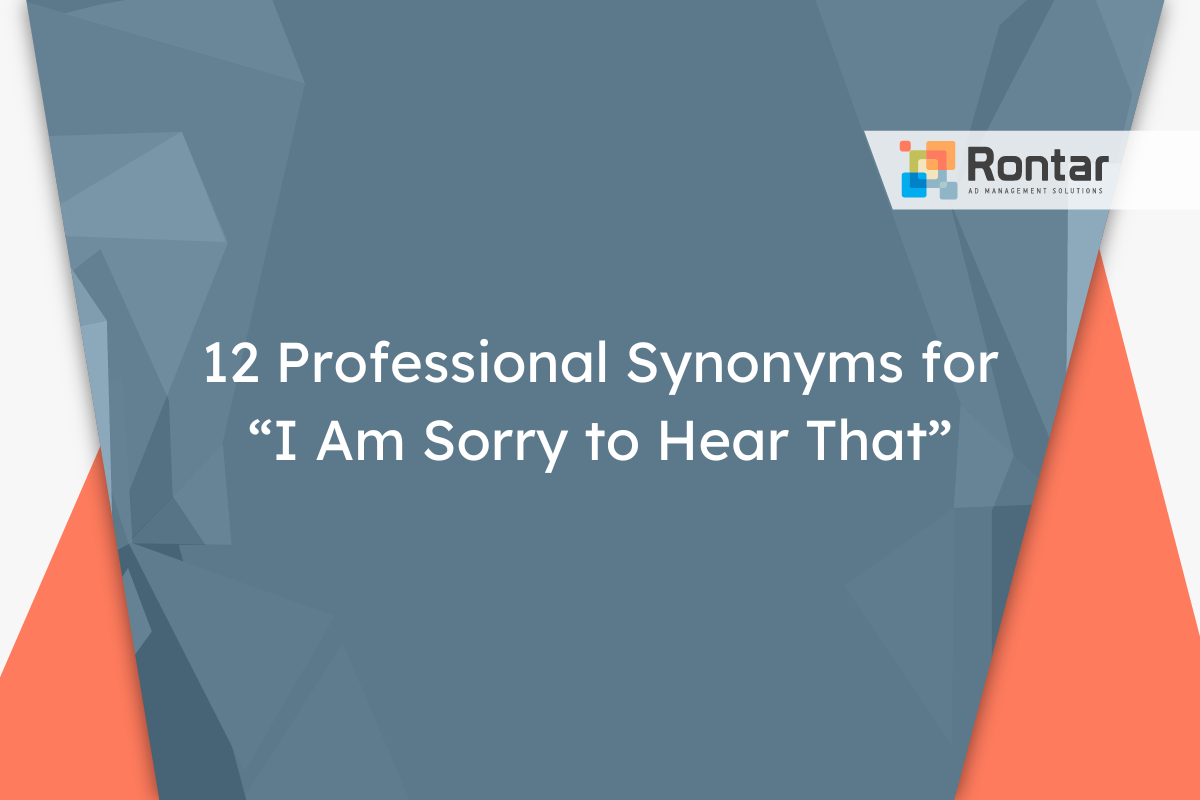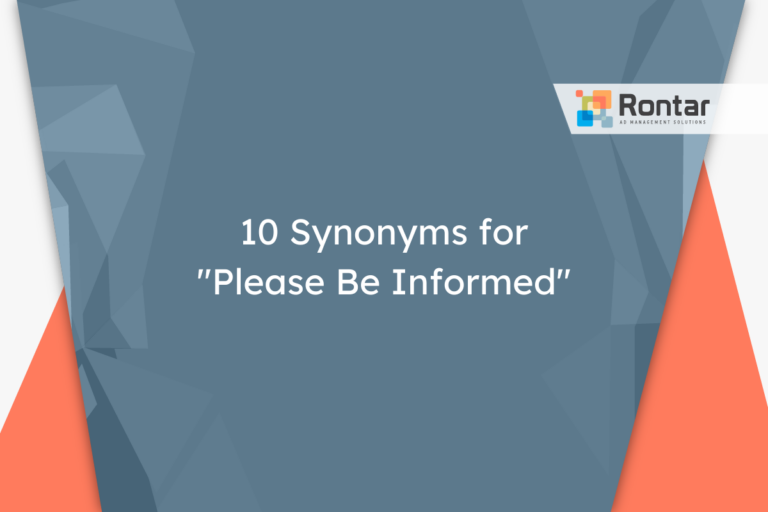12 Professional Synonyms for “I Am Sorry to Hear That”

In professional emails, saying “I am sorry to hear that” can sometimes feel too simple or not enough.
This article gives you 12 different ways to express your sympathy or condolences that fit better in various situations. Each alternative is explained with details on when to use it and an example of how it can be used in an email.
Is It Professional to Say “I Am Sorry to Hear That”?
Yes, the phrase “I am sorry to hear that” is considered professional, formal, and polite. It’s a way to show empathy and concern without diving too deep into personal feelings. This makes it suitable for professional settings where maintaining a certain level of formality and professionalism is important.
It’s best used in situations where someone shares disappointing news, difficult situations, or challenges they are facing. For instance, if a colleague tells you they didn’t get a promotion they were hoping for, this phrase is an appropriate response.
Here’s an example of how to use “I am sorry to hear that” in a brief email:
Hi Samantha, Thank you for updating me on the project's status. I am sorry to hear that the client has decided not to go ahead with our proposal. Let's schedule a meeting to discuss our next steps and how we can improve our approach in future proposals. Best regards, Michael
Pros:
- Shows empathy and understanding.
- Keeps the tone professional and respectful.
- Appropriate for various situations, ranging from personal losses to professional setbacks.
Cons:
- Can seem generic if overused or not followed by a more personalized message.
- May not convey the depth of empathy in situations requiring more emotional support.
While “I am sorry to hear that” is effective in many situations, sometimes you might want to use an alternative phrase. This could be because the phrase may seem too formal or too generic, or you might just want to convey your feelings in a different way.
In professional settings, it’s valuable to have a range of synonyms at hand for expressing empathy. By doing so, you can tailor your response to the specific situation and relationship you have with the other person, making your message feel more personal and thoughtful.
12 Other Ways to Say “I Am Sorry to Hear That”
When looking to express sympathy or condolences in a more nuanced way, consider these professional synonyms. Each alternative offers a slightly different tone or level of formality, allowing you to tailor your message to the situation and your relationship with the recipient.
- My thoughts are with you
- I’m truly sorry for what you’re going through
- Please accept my deepest sympathies
- I offer my sincere condolences
- My heart goes out to you
- Is there anything I can do?
- I empathize with you
- I understand this is disappointing
- That’s unfortunate news
- I regret to hear that
- My sympathies for this situation
- This is unfortunate to learn of this
1. My thoughts are with you
Compared to “I am sorry to hear that,” this phrase conveys a more personal and thoughtful connection. It suggests that you are mentally and emotionally supportive of the person during their difficult time. This alternative is less formal, making it suitable for both professional and personal messages.
This phrase is particularly effective in situations where you want to express solidarity or support without delving into the emotional specifics. It’s respectful and conveys your concern in a polite and professional manner.
Here’s an example of how to use this phrase in an email:
Hi Alex, I just read your message about the recent challenges your team has been facing. My thoughts are with you during this tough time. Please let me know if there's any way I can assist. Best wishes, Samantha
2. I’m truly sorry for what you’re going through
This synonym adds a layer of empathy and personal connection beyond the original phrase. It shows that you not only acknowledge the recipient’s situation but also feel for them on a more personal level. This alternative is slightly more informal, which makes it suitable for messages where you have a closer relationship with the recipient.
Use this phrase when you want to emphasize your personal concern and willingness to support the recipient. It’s especially appropriate in informal emails or messages where a deeper emotional connection is present.
Here’s a sample of how to incorporate it into an email:
Hi Michelle, Hearing about the loss you've experienced has deeply moved me. I'm truly sorry for what you're going through. If there's anything I can do to help, please don't hesitate to reach out. Warm regards, Tom
3. Please accept my deepest sympathies
This phrase is a formal and traditional way of expressing condolences, making it a suitable professional synonym for “I am sorry to hear that.” It’s particularly fitting for serious situations, such as the loss of a loved one or a significant personal setback.
It’s best used in formal communications when you want to express sympathy in a respectful and dignified manner. This phrase conveys your condolences with the appropriate level of seriousness and formality.
Here’s an example of its usage in an email:
Dear Mr. Thompson, I was saddened to learn about the passing of your colleague. Please accept my deepest sympathies during this difficult time. Sincerely, Elizabeth
4. I offer my sincere condolences
This alternative is another formal and respectful way to express sympathy, especially in the context of a loss. It’s a bit more formal than “I’m sorry to hear that,” indicating a high level of sincerity and depth of feeling.
It is well-suited for professional settings or when addressing someone you may not know personally but wish to express sympathy to. This phrase communicates a deep level of respect and understanding for the recipient’s situation.
Here’s how you might use it in an email:
Dear Ms. Alvarez, Upon hearing of your father's passing, I offer my sincere condolences to you and your family during this time of mourning. With sympathy, George
5. My heart goes out to you
This phrase is more informal and emotional, suggesting a personal connection and genuine concern for the recipient’s well-being. It’s a way to show empathy and personal support, making it slightly less formal than the original phrase.
Use this when you have a closer relationship with the person and want to express your feelings in a heartfelt way. It’s particularly effective in conveying personal support and empathy in a polite manner.
Here’s a sample email using this phrase:
Hello Jenna, Learning about the recent difficulties you've been facing at work, my heart goes out to you. Please remember I'm here to support you in any way I can. Kindly, Oliver
6. Is there anything I can do?
This phrase directly offers help and shows a willingness to support the recipient actively. It’s less formal and more action-oriented than the original phrase, making it suitable for when you want to offer practical assistance.
This is a great choice when you have a relationship with the person that allows you to offer help genuinely. It shows not just sympathy, but a readiness to be involved in providing support, making it ideal for both professional and informal contexts.
Here’s an example of this phrase in action:
Hi Liam, I was disheartened to hear about the flood damage to your home. Is there anything I can do to help during this challenging time? Best, Sophie
7. I empathize with you
This alternative conveys a deep understanding and sharing of feelings, suggesting that you can put yourself in the recipient’s shoes. It’s somewhat formal yet deeply personal, bridging the gap between a detached acknowledgment and a heartfelt expression of support.
This phrase is best used when you have a shared understanding or experience that makes your empathy genuine. It’s particularly effective in professional contexts where you want to express understanding without overstepping personal boundaries.
Here’s how it could be incorporated into an email:
Hi Marcus, Hearing about the challenges your project is facing, I empathize with you and the team. Please let me know how I can assist. Regards, Emily
8. I understand this is disappointing
This phrase acknowledges the recipient’s feelings directly, making it a good choice for situations where disappointment or frustration is the main issue. It’s straightforward and somewhat formal, suitable for professional interactions.
It’s most effective when you’re acknowledging a setback or a failure to meet expectations, offering a way to express sympathy while also recognizing the recipient’s feelings of disappointment. This makes it a good option for professional emails where acknowledging the situation directly is appreciated.
Here’s a sample email:
Hi Carlos, After reviewing the project outcomes, I understand this is disappointing for everyone involved. Let's discuss how we can move forward. Best regards, Natalie
9. That’s unfortunate news
This synonym is a straightforward, neutral way to acknowledge bad news. It’s suitable for professional and formal contexts because it expresses sympathy without becoming too personal.
When you need to acknowledge a setback without delving into emotional support, this phrase is appropriate. It’s ideal for professional communications where you want to express concern but maintain a certain level of detachment.
Here’s an example of its use:
Hi Henry, We've received your report on the market analysis. That's unfortunate news about the recent trends, but let's work together on a strategy to overcome this. Sincerely, Julia
10. I regret to hear that
This alternative expresses a formal acknowledgment of bad news, similar to “I am sorry to hear that” but with a slightly more formal tone. It’s appropriate for professional settings where you want to convey your condolences or regret in a respectful manner.
This phrase is well-suited for formal emails, especially in a business context where you’re expressing regret about a situation or outcome. It conveys a polite and professional sentiment.
Here’s how you might use it in an email:
Hi Rebecca, Upon reviewing the quarterly financials, I regret to hear that we did not meet our targets. Let's schedule a meeting to discuss our next steps. Kind regards, Derek
11. My sympathies for this situation
This phrase offers a formal yet heartfelt expression of sympathy. It’s slightly more personal than “I am sorry to hear that,” making it suitable for both professional and close personal relationships.
When you want to express your sympathy in a way that is both professional and sincere, this phrase works well. It’s especially fitting for situations that are not only disappointing but also impact the person on a more personal level.
Here’s a sample usage in an email:
Hello Vanessa, Learning of the challenges faced by your department, my sympathies for this situation. I'm available to discuss how we might address these issues together. Yours truly, Ian
12. This is unfortunate to learn of this
This phrase is a more formal way of acknowledging bad news, emphasizing the unfortunate nature of the situation. It’s suitable for professional communications where you want to express sympathy without assuming too much familiarity.
When you’re dealing with a situation that is clearly negative and affects business or personal outcomes, using this phrase shows understanding in a professional manner. It’s appropriate for conveying concern while keeping the message formal.
Here’s an example of incorporating it into an email:
Hi Thomas, This is unfortunate to learn of this. We need to discuss our options for minimizing impact. Regards, Lucy
Final Thoughts
Choosing the right way to say “I am sorry to hear that” in an email is important. It shows that you care and are thinking about the other person’s feelings. The 12 alternatives provided offer different tones and levels of formality to match any situation. By using these phrases, you can communicate your sympathy more effectively and make a positive impact in a professional setting.






